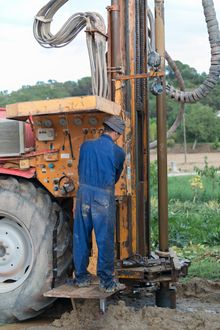
A well’s casing is the material that lines the sides of the well-shaft, lending support to the structure and protecting the wires, pipes, and other components that allow the well to function. Well companies take several factors into account when choosing the casing, including environmental and geological concerns. Here are a few of the benefits of steel versus plastic casings.
The Differences Between Steel & Plastic Casings
Steel
 Steel is strong enough to support the well for decades. It can also withstand extreme temperatures, which is helpful in areas with harsh weather. Steel won’t crack during the installation process, which leaves the well in the best and most effective condition possible. For many years, these qualities made well companies choose steel most frequently.
Steel is strong enough to support the well for decades. It can also withstand extreme temperatures, which is helpful in areas with harsh weather. Steel won’t crack during the installation process, which leaves the well in the best and most effective condition possible. For many years, these qualities made well companies choose steel most frequently.
Plastic
Thermoplastic, also called PVC, has become much more prominent as a material for well casings over the past several decades. This is the result of advances in manufacturing that have made it stronger and more corrosion-resistant. One big advantage to plastic is the fact that it doesn’t break down from high alkaline content in the water. Also, plastic doesn’t conduct electricity, which means it won’t degrade from electrolysis. This contributes to the longevity of the well.
Environmental Factors
In making this choice, your well company will consider how alkaline or acidic the water is, and whether there are any other factors present that might contribute to corrosion. Additionally, some states have requirements for what type of material must be used.
Looking for a well company to assist with well repair, drilling, emergency well services, and more? Contact All’s Well in Fairbanks, AK, for all your needs. Over the past 15 years, the owner has earned a reputation for reliable and trustworthy work, and he strives to provide affordable prices to all his clients. Learn more today online or by calling (907)455-4082.
About the Business
Have a question? Ask the experts!
Send your question

